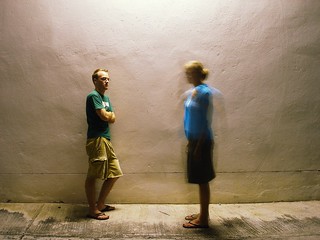The booklet will extend our thinking and insights into how people with differing worldviews can effectively work together.
So, these are some first thoughts to get some things down in writing, which is a challenge when so much of this work is deeply experiential!
To be in relationship is to connect, to join together, to get in touch with, or establish rapport (cf. etymology of connect). We can relate a story, or associate with, or relate to others.
Some initial questions:
- Relationships are key to our work - why?
- What kind of relationships do we mean?
- Why are they so important and necessary?
 |
| Image by Michael Sarver on Flickr. |
Engagement is a “bottom up,” grassroots process that cannot be directed from above. Engagement occurs when [people] undertake tasks related to their interests and competence, learn about them continuously, participate freely with (equal) associates, immerse themselves deeply, and continue the task with persistence and commitment because of the value they attribute to the work.Relationships - what do they look like? They are dynamic, oscillating, complex, light and shade, generative and integral to our human existence. They include values and beliefs, actions and behaviours, practices and habits, past and present, memories and moments. They require talking, touching, teaching, learning, time, frequency, preparation, mindfulness, reflection, vulnerability, honesty, trust, respect, authenticity, reciprocity and generosity. They require our whole being, and we require whole relationships to truly be the best versions of ourselves that we can be. I like Moustakas's thinking on relationships in terms of "being with," together...
Moustakas, Being-In, Being-For, Being-With (1995, p. 70, 71):
In the authentic relationship, there is a facing up to the feelings and issues, an exercise of wills, without the will on either side being negated, impaired, or broken. The will ignites the fires of determination and enables one to face the old patterns of criticism, adversity, and rejection; enables one to live with the negative feelings and thoughts while creating new images and meanings in the process.And finally why is this all necessary? We have realised, through our project, that for people to manage the unsettled nature of the work they are doing, the relationships they develop help to provide a sort of human glue. Our project is a decolonizing one. It asks people to question their very foundations - the worldviews they hold and the values it supports. This is disruptive, destablising and disconcerting. Relating to others in this contested space enables people to feel safe during such struggle and each feels care and concern for the other.
Conversation is relationship. How we relate to each other occurs through our language and communication (verbal, body, explicit, implicit, coded, power-laden, and so on). A space in which to converse is potentially a decolonizing space - a contested space. It is a space that enables many different views to be shared without persecution and where each voice is respected in the representation of the speaker's worldview. It's not easy to maintain such a space but is necessary if decolonizing is to occur. Interestingly, the etymology of "contested" is, "to bear witness together" - I love it! :o)...
Decolonizing work - looks like undoing structures, breaking current habits and pausing current actions and processes - destabilising, ground moves from under us, we can no longer rely on what we know and think of as 'truth' and so feel displaced and uncertain. I'm reminded of Iseke's work with Canadian Elders when thinking about how this work can decolonize, through the very presence of the Elders and their spiritual rites, rituals and knowledge.
More thoughts to come, and though this may not be well structured as yet, I'm feeling the urge to write otherwise it's difficult to get the words out at all!
No comments:
Post a Comment